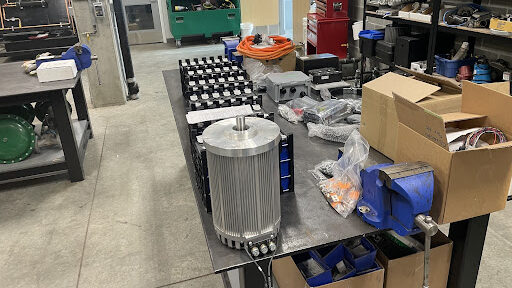Have you ever wondered if it was possible to convert a gas vehicle with an engine to something completely electric? This is a mission that TRU power engineering instructor Byron Poppelton decided to undertake along with his students.
After the project was approved, Poppleton and his students began to retrofit the vehicle earlier this month. Under the terms of the project, Poppleton and his students agreed to complete the labour for the project, with TRU’s Sustainability Office responsible for paying for the parts — including an electric motor and six lithium-ion batteries – amounting to just under $30,000. Additionally, BC Hydro also agreed to contribute $7,000 towards the initiative in the form of a sponsorship.
TRU’s environmental programs coordinator, James Gordon, said that the sustainability office approved this project because it gives trades students practical opportunities and contributes to the university’s policy to accrue electric vehicles when possible.
“We liked the nature of the project for several different reasons,” Gordon said. “We’re an educational institution, and by going through this project not only will instructors like Byron benefit from the learning that’ll happen — but also students from the trades department are going to be directly involved.”
Along with his students’ help, Poppleton removed the engine from the 1999 Chevy Astro Van on Oct. 14. He said that he aims to have the entire project completed by April 2024 and is looking forward to getting started on the next steps.
“There’s no gas tank, there’s no exhaust. All that weight is taken out of here, which is great,” Poppleton said. “We’re going to use the same transmission, and we’re gonna build an adapter plate to hook the electric motor directly to the transmission.”
Poppleton said that although combustion engines have certainly improved throughout recent years, their energy efficiency isn’t comparable to electric vehicles. This belief served as the catalyst for the entire project.
“Financially, this isn’t the way to go because you can buy a good used electric car for less money than it’s gonna cost on this conversion, Poppleton said. “We did it to raise the profile of electric cars and trades at TRU.”
In addition to raising the profile of the trades department at the university, Poppleton is also giving students a chance to have some hands-on experience: his power-engineering class removed the engine, millwrights and machinists will be building the adapter plate and attaching the transmission to the motor, and electrical students will handle the wiring and electrical components of the build.
Formally a TRU maintenance van, the Chevy Astro will do the same job once it is completely converted to electricity. Poppleton said it had been driven for around 100 kilometres, primarily on and around campus.
“The reason that I like this project is because we’re gonna use a service van. Something that only is used during the day, never leaves town [and] does less than a hundred kilometres in a day,” Poppleton said.
Outside of class hours, Poppleton even owns an electric vehicle. He said that although fossil fuels may be effective in heating large buildings or plants, electric motors are the most practical and efficient option when it comes to commuting.
“Burning fossil fuels, just to go from here to the 7-Eleven is insane,” Poppleton said, “A lot of people don’t understand how inefficient cars are…because a lot of that heat goes out your radiator and out your exhaust system,”
Between now and the conclusion of the Winter semester Poppleton and his students will be looking to raise awareness about electric cars at TRU. If everything goes as planned the refurbished electric maintenance van will be rolling around campus come springtime.
“We really haven’t hit any hurdles yet… I don’t anticipate any big problems, but putting the electrical together is gonna be a little more challenging,” he said.
Fourth-class power engineers can expect a wage between $30 and $35 per hour and typically work in industrial mills and plants. TRU offers a nine-month course to earn this certification that runs between September and May each year. For more information, contact the trades department via email at trades@tru.ca or phone at (250)371-5797.

